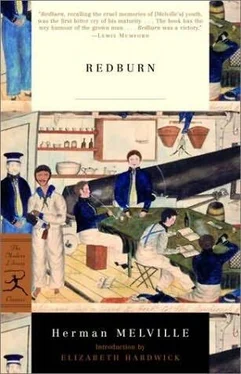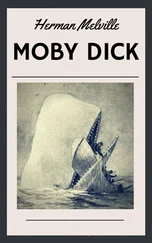Herman Melville - Redburn. His First Voyage
Здесь есть возможность читать онлайн «Herman Melville - Redburn. His First Voyage» весь текст электронной книги совершенно бесплатно (целиком полную версию без сокращений). В некоторых случаях можно слушать аудио, скачать через торрент в формате fb2 и присутствует краткое содержание. Жанр: Классическая проза, на английском языке. Описание произведения, (предисловие) а так же отзывы посетителей доступны на портале библиотеки ЛибКат.
- Название:Redburn. His First Voyage
- Автор:
- Жанр:
- Год:неизвестен
- ISBN:нет данных
- Рейтинг книги:4 / 5. Голосов: 1
-
Избранное:Добавить в избранное
- Отзывы:
-
Ваша оценка:
- 80
- 1
- 2
- 3
- 4
- 5
Redburn. His First Voyage: краткое содержание, описание и аннотация
Предлагаем к чтению аннотацию, описание, краткое содержание или предисловие (зависит от того, что написал сам автор книги «Redburn. His First Voyage»). Если вы не нашли необходимую информацию о книге — напишите в комментариях, мы постараемся отыскать её.
Redburn. His First Voyage — читать онлайн бесплатно полную книгу (весь текст) целиком
Ниже представлен текст книги, разбитый по страницам. Система сохранения места последней прочитанной страницы, позволяет с удобством читать онлайн бесплатно книгу «Redburn. His First Voyage», без необходимости каждый раз заново искать на чём Вы остановились. Поставьте закладку, и сможете в любой момент перейти на страницу, на которой закончили чтение.
Интервал:
Закладка:
But even under this favorable turn of affairs, much apprehension was still entertained, lest in crossing the Grand Banks of Newfoundland, the fogs, so generally encountered there, might bring on a return of the fever. But, to the joy of all hands, our fair wind still held on; and we made a rapid run across these dreaded shoals, and southward steered for New York.
Our days were now fair and mild, and though the wind abated, yet we still ran our course over a pleasant sea. The steerage-passengers-at least by far the greater number-wore a still, subdued aspect, though a little cheered by the genial air, and the hopeful thought of soon reaching their port. But those who had lost fathers, husbands, wives, or children, needed no crape, to reveal to others, who they were. Hard and bitter indeed was their lot; for with the poor and desolate, grief is no indulgence of mere sentiment, however sincere, but a gnawing reality, that eats into their vital beings; they have no kind condolers, and bland physicians, and troops of sympathizing friends; and they must toil, though to-morrow be the burial, and their pallbearers throw down the hammer to lift up the coffin.
How, then, with these emigrants, who, three thousand miles from home, suddenly found themselves deprived of brothers and husbands, with but a few pounds, or perhaps but a few shillings, to buy food in a strange land?
As for the passengers in the cabin, who now so jocund as they? drawing nigh, with their long purses and goodly portmanteaus to the promised land, without fear of fate. One and all were generous and gay, the jelly-eyed old gentleman, before spoken of, gave a shilling to the steward.
The lady who had died, was an elderly person, an American, returning from a visit to an only brother in London. She had no friend or relative on board, hence, as there is little mourning for a stranger dying among strangers, her memory had been buried with her body.
But the thing most worthy of note among these now light-hearted people in feathers, was the gay way in which some of them bantered others, upon the panic into which nearly all had been thrown.
And since, if the extremest fear of a crowd in a panic of peril, proves grounded on causes sufficient, they must then indeed come to perish;-therefore it is, that at such times they must make up their minds either to die, or else survive to be taunted by their fellow-men with their fear. For except in extraordinary instances of exposure, there are few living men, who, at bottom, are not very slow to admit that any other living men have ever been very much nearer death than themselves. Accordingly, craven is the phrase too often applied to any one who, with however good reason, has been appalled at the prospect of sudden death, and yet lived to escape it. Though, should he have perished in conformity with his fears, not a syllable of craven would you hear. This is the language of one, who more than once has beheld the scenes, whence these principles have been deduced. The subject invites much subtle speculation; for in every being's ideas of death, and his behavior when it suddenly menaces him, lies the best index to his life and his faith. Though the Christian era had not then begun, Socrates died the death of the Christian; and though Hume was not a Christian in theory, yet he, too, died the death of the Christian, — humble, composed, without bravado; and though the most skeptical of philosophical skeptics, yet full of that firm, creedless faith, that embraces the spheres. Seneca died dictating to posterity; Petronius lightly discoursing of essences and love-songs; and Addison, calling upon Christendom to behold how calmly a Christian could die; but not even the last of these three, perhaps, died the best death of the Christian.
The cabin passenger who had used to read prayers while the rest kneeled against the transoms and settees, was one of the merry young sparks, who had occasioned such agonies of jealousy to the poor tailor, now no more. In his rakish vest, and dangling watch-chain, this same youth, with all the awfulness of fear, had led the earnest petitions of his companions; supplicating mercy, where before he had never solicited the slightest favor. More than once had he been seen thus engaged by the observant steersman at the helm: who looked through the little glass in the cabin bulk-head.
But this youth was an April man; the storm had departed; and now he shone in the sun, none braver than he.
One of his jovial companions ironically advised him to enter into holy orders upon his arrival in New York.
"Why so?" said the other, "have I such an orotund voice?"
"No;" profanely returned his friend-"but you are a coward — just the man to be a parson, and pray."
However this narrative of the circumstances attending the fever among the emigrants on the Highland may appear; and though these things happened so long ago; yet just such events, nevertheless, are perhaps taking place to-day. But the only account you obtain of such events, is generally contained in a newspaper paragraph, under the shipping-head. There is the obituary of the destitute dead, who die on the sea. They die, like the billows that break on the shore, and no more are heard or seen. But in the events, thus merely initialized in the catalogue of passing occurrences, and but glanced at by the readers of news, who are more taken up with paragraphs of fuller flavor; what a world of Me and death, what a world of humanity and its woes, lies shrunk into a three-worded sentence!
You see no plague-ship driving through a stormy sea; you hear no groans of despair; you see no corpses thrown over the bulwarks; you mark not the wringing hands and torn hair of widows and orphans:-all is a blank. And one of these blanks I have but filled up, in recounting the details of the Highlander's calamity.
Besides that natural tendency, which hurries into oblivion the last woes of the poor; other causes combine to suppress the detailed circumstances of disasters like these. Such things, if widely known, operate unfavorably to the ship, and make her a bad name; and to avoid detention at quarantine, a captain will state the case in the most palliating light, and strive to hush it up, as much as he can.
In no better place than this, perhaps, can a few words be said, concerning emigrant ships in general.
Let us waive that agitated national topic, as to whether such multitudes of foreign poor should be landed on our American shores; let us waive it, with the one only thought, that if they can get here, they have God's right to come; though they bring all Ireland and her miseries with them. For the whole world is the patrimony of the whole world; there is no telling who does not own a stone in the Great Wall of China. But we waive all this; and will only consider, how best the emigrants can come hither, since come they do, and come they must and will.
Of late, a law has been passed in Congress, restricting ships to a certain number of emigrants, according to a certain rate. If this law were enforced, much good might be done; and so also might much good be done, were the English law likewise enforced, concerning the fixed supply of food for every emigrant embarking from Liverpool. But it is hardly to be believed, that either of these laws is observed.
But in all respects, no legislation, even nominally, reaches the hard lot of the emigrant. What ordinance makes it obligatory upon the captain of a ship, to supply the steerage-passengers with decent lodgings, and give them light and air in that foul den, where they are immured, during a long voyage across the Atlantic? What ordinance necessitates him to place the galley, or steerage-passengers' stove, in a dry place of shelter, where the emigrants can do their cooking during a storm, or wet weather? What ordinance obliges him to give them more room on deck, and let them have an occasional run fore and aft? — There is no law concerning these things. And if there was, who but some Howard in office would see it enforced? and how seldom is there a Howard in office!
Читать дальшеИнтервал:
Закладка:
Похожие книги на «Redburn. His First Voyage»
Представляем Вашему вниманию похожие книги на «Redburn. His First Voyage» списком для выбора. Мы отобрали схожую по названию и смыслу литературу в надежде предоставить читателям больше вариантов отыскать новые, интересные, ещё непрочитанные произведения.
Обсуждение, отзывы о книге «Redburn. His First Voyage» и просто собственные мнения читателей. Оставьте ваши комментарии, напишите, что Вы думаете о произведении, его смысле или главных героях. Укажите что конкретно понравилось, а что нет, и почему Вы так считаете.












